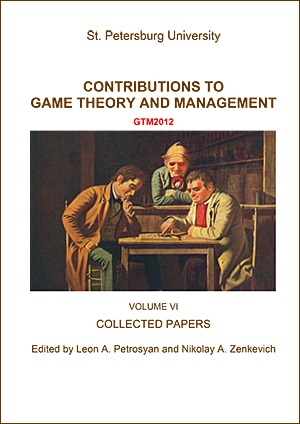When it Pays to Think about the Competition, and When it Doesn't: Exploring Overconfidence Bias in Dynamic Games
Abstract
Despite robust behavioral research that shows a widespread bias towards overconfidence in competitive scenarios, e.g., underestimating the competitor's skill level, there is little research on the long term costs associated with this bias. We develop a theoretical framework that allows us to explore systematic long-term ramifications of opponent skill estimation bias across different competitive contexts relevant to managers. We capture these contexts with dynamic branching games that are parametrized by four features. We use Monte Carlo estimation methods to test how the expected game outcomes compare under different types biases. The results suggest that bias in evaluating an opponent's skill level is less harmful when the opponent is more skilled, and when there is greater first-mover advantage. Furthermore, they suggest that if there is any effort cost associated with making a decision, then a bias towards overestimating the opponent's skill is never advantageous, while a bias towards underestimating can be advantageous in many contexts.
Keywords:
bounded rationality, overconfidence bias, heuristics
Downloads
References
Boulding, W., A. Kalra and R. Staelin (1999). The quality double whammy. Marketing Science, 18(4), 131–152.
Camerer, C. and E. Johnson (2004). Thinking about attention in games: Backward and forward induction. In: The Psychology of Economic Decisions, pp. 111–129. Oxford University Press.
Camerer, C. and D. Lovallo (1999). Overconfidence and excess entry: An experimental approach. The American Economic Review, 89(1), 428–443.
Camerer, C., T. H. Ho and J. K. Chong (2004). A cognitive hierarchy model of games. The Quarterly Journal of Economics, 119(3), 861–898.
Gabaix X. and D. Laibson (2000). A boundedly rational decision algorithm. American Economic Review, 90(2), 433–438.
Gigerenzer, G. and R. Selten (2001). Bounded rationality: The adaptive toolbox. MIT Press: Cambridge.
Hoffrage, U. (2004). Cognitive Illusions: a handbook on fallacies and biases in thinking, judgement and memory. Psychology Press: New York.
Hsu, T. A. (2002). Behind Deep Blue. Princeton University Press: Princeton.
Johnson, E. and J. Payne (1985). Effort and accuracy in choice. Management Science, 31(4), 395–414.
Johnson, E., C. Camerer, S. Sen and T. Rymon (2002). Detecting failures of backward induction: Monitoring information search in sequential bargaining. Journal of Economic Theory, 104(1), 16–47.
Narasimhan, C., C. He, E. Anderson, L. Brenner, P. Desai, D. Kuksov, P. Messinger, S. Moorthy, J. Nunes, Y. Rottenstreich, R. Staelin, G. Wu and Z. Zhang (2005). Incorporating behavioral anomalies in strategic models. Marketing Letters, 16(3), 361–373.
Newell, A. and H. A. Simon (1972). Human problem solving. Prentice-Hall: Englewood Cliffs, NJ.
Payne, J. W., J. R. Bettman, E. J. Johnson and M. F. Luce (1995). An information processing perspective on choice. In: Psychology of Learning and Motivation (J. Busemeyer, R. Hastie, and D. L. Medin, ed), Vol. 2, pp. 137–175. Academic Press: New York.
Payne, J. W., J. R. Bettman and M. F. Luce (1996). When time is money: Decision behavior under opportunity-cost time pressure. Organizational Behavior and Human Decision Processes, 66(2), 131–152.
Russell, S. and P. Norvig (2003). Artificial Intelligence: A Modern Approach. Pearson Education: Upper Saddle River, New Jersey.
Savage, L. (1954). The foundations of statistics. Wiley: New York.
Shugan, S. M. (1980). The cost of thinking. Journal of Consumer Research, 7(2), 99–111.
Stahl, D. O. (1993). Evolution of smart players. Games and Economic Behavior, 5, 604–617.
Stahl, D. O. and P. W. Wilson (1995). On player's models of other players: Theory and experimental evidence. Games and Economic Behavior, 10(1), 218–254.
Downloads
Published
How to Cite
Issue
Section
License
Articles of "Contributions to Game Theory and Management" are open access distributed under the terms of the License Agreement with Saint Petersburg State University, which permits to the authors unrestricted distribution and self-archiving free of charge.




